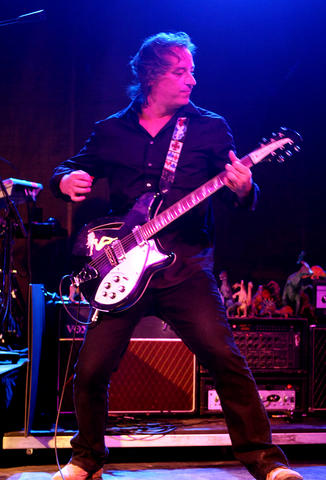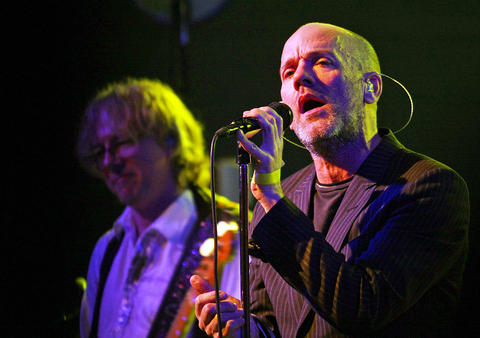It began as a tiny showcase for independent bands, but as South by Southwest (SXSW) celebrates its 22nd year, it seems as if the festival's success has come to overshadow its original purpose as a platform for aspiring musicians.
SXSW has become a massive music, film and interactive technology extravaganza, and last year pumped an estimated US$95 million into the economy of Austin, Texas, where 70 live music venues are concentrated mostly in an area just south of the state's capitol building.
The changes have caused many who make the annual pilgrimage to the city that calls itself "The Live Music Capital of the World" to question whether it is worth the US$165 festivalgoers pay, or the several hundred US dollars participating bands fork over, to access to the official showcases.

PHOTO :AP
"It's all about major labels showcasing their goods," said Cody Lee, a musician who was making his fourth trip to SXSW. "Really it should be all about these unsigned bands that are looking for opportunities. But that doesn't pay the bills."
"It's turned me off," said Austin resident and musician Ruben Olivarez. "It was supposed to be more for the local scene. Then all of a sudden it blew up to a big corporate thing."
Media presence at this year's SXSW was so large that when rock icon and former Velvet Underground frontman Lou Reed gave the festival's keynote address at the Austin Convention Center on Thursday, part of his audience watched him on a video screen in a second auditorium.

PHOTO :AP
And that was just one of more than 70 panel discussions with music and tech industry heavyweights. Others included RealNetworks CEO Rob Glaser, Sire Records President Seymour Stein and Ticketmaster CEO Sean Moriarity.
Meanwhile, at music venues downtown, people waited in line for hours to see indie-rock legends Yo La Tengo and Irish singer Van Morrison. At midnight on Thursday, REM performed to capacity crowd at a mid-sized club to promote the band's new album.
But for every official showcase, meaning a show that is open only to people wearing registration bracelets or media or corporate passes, there's a free show at the club, bar or restaurant next door.

PHOTO: AP
Austin residents and musicians say that these unofficial showcases are just as good - if not better - than the officially sanctioned events.
"All of the good bands are playing at the free shows," said John Lynch, a tour manager who booked Lee's band The Cush at two unofficial shows. (Lynch brought UK post-rock band Yndi Halda to Taiwan for last year's Formoz festival.)
"It's all about politics, and that's why bands like The Cush are playing gigs outside South by Southwest because there's less and less opportunities for unsigned bands to get showcases," Lee said. "That's why its cool to play these kind of showcases because they're outside the box. I get to discover some new acts and I also get to see a lot of bands I never see."
According to organizers, SXSW attracted about 700 attendees in 1987. Last year, attendance at all sanctioned SXSW events totaled 126,900. More than 1,500 artists officially played the SXSW music festival. This year, some 8,000 bands applied to participate in the festival.
Thousands more musicians show up every year to play unofficial shows at clubs, restaurants and cafes. Some even set up their equipment and start playing on the street. Record label representatives are everywhere, and each year a dozen or so lucky unknown acts get signed. In recent years, many more have been able to sell songs for commercials and ring tones.
On Friday, Olivarez was hoping he could get off from work early so he could head down to Backspin Records for a techno and hip-hop party with free beer.
Olivarez, also a musician whose 1970s hard-rock cover band The VoSots was not performing at SXSW, doesn't see the need to pay to see the official events when he can see so many quality shows for free.
"I just go hang out, check out the scene," he said. "A lot of the stuff, wrist bands and all that, goes to out-of-towners."
When The Cush played at Jaime's on Red River on Thursday, Mick Jones, formerly of The Clash, was sighted in the restaurant's outdoor patio, where there was room for an audience of maybe two-dozen people. At a different venue on Wednesday night, bandmembers said they met Thurston Moore of Sonic Youth.
"That kind of stuff doesn't happen in your home town," said vocalist Gabrielle Douglass who lives in Burlington, Vermont.
Austin musician Lauren Marie - stage name Miss Lauren Marie - said the festival is "very corporate." But festivalgoers, she said, tend to seek out the best music regardless of whether it's at a fancy venue or a hole-in-the-wall.
Her advice for people attending the festival for the first time: Wander around downtown Austin until you hear something that you like. As often as not, it won't be coming from an official venue.
"There's so much talent here," she said. "Hit the stuff that isn't South by Southwest and you're gonna see some good stuff."

On April 26, The Lancet published a letter from two doctors at Taichung-based China Medical University Hospital (CMUH) warning that “Taiwan’s Health Care System is on the Brink of Collapse.” The authors said that “Years of policy inaction and mismanagement of resources have led to the National Health Insurance system operating under unsustainable conditions.” The pushback was immediate. Errors in the paper were quickly identified and publicized, to discredit the authors (the hospital apologized). CNA reported that CMUH said the letter described Taiwan in 2021 as having 62 nurses per 10,000 people, when the correct number was 78 nurses per 10,000

May 5 to May 11 What started out as friction between Taiwanese students at Taichung First High School and a Japanese head cook escalated dramatically over the first two weeks of May 1927. It began on April 30 when the cook’s wife knew that lotus starch used in that night’s dinner had rat feces in it, but failed to inform staff until the meal was already prepared. The students believed that her silence was intentional, and filed a complaint. The school’s Japanese administrators sided with the cook’s family, dismissing the students as troublemakers and clamping down on their freedoms — with

As Donald Trump’s executive order in March led to the shuttering of Voice of America (VOA) — the global broadcaster whose roots date back to the fight against Nazi propaganda — he quickly attracted support from figures not used to aligning themselves with any US administration. Trump had ordered the US Agency for Global Media, the federal agency that funds VOA and other groups promoting independent journalism overseas, to be “eliminated to the maximum extent consistent with applicable law.” The decision suddenly halted programming in 49 languages to more than 425 million people. In Moscow, Margarita Simonyan, the hardline editor-in-chief of the

Six weeks before I embarked on a research mission in Kyoto, I was sitting alone at a bar counter in Melbourne. Next to me, a woman was bragging loudly to a friend: She, too, was heading to Kyoto, I quickly discerned. Except her trip was in four months. And she’d just pulled an all-nighter booking restaurant reservations. As I snooped on the conversation, I broke out in a sweat, panicking because I’d yet to secure a single table. Then I remembered: Eating well in Japan is absolutely not something to lose sleep over. It’s true that the best-known institutions book up faster